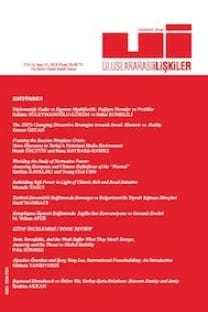İnsanlık, Sosyo-politik Topluluk ve Evrensellik/Farklılık: Andrew Linklater
Uluslararası ilişkiler kuramında son dönemde yapılan tartışmalar, özerk bir gerçeklik alanı olarak uluslararasının ahlaki, sosyal ve siyasal bir kavramsallaştırmasının imkânı etrafında gerçekleşmektedir. Andrew Linklater’ın geliştirdiği eleştirel uluslararası siyaset kuramı, tarihi-toplumsal bir gerçeklik olarak modern uluslararası fikrinin, normatif anlamda, insanlık ve vatandaşlık ilişkisinin tikelci bir siyasal ontoloji üzerinden tanımlanmasına dayandığını ileri sürer. Etik evrenselci bir perspektiften hareketle sosyo-politik topluluğun normatif, tarihselsosyolojik ve pratik düzlemlerdeki dönüşümüyle daha evrenselci, daha az eşitsiz ve farklılığa daha fazla duyarlı bir küresel siyaset kuramı önerir. Bu makale; eleştirel uluslararası siyaset kuramının, çağdaş dünyada çoğul sosyo-politik toplulukların bir arada varoluşunun ahlaki, sosyal ve siyasal koşullarının kapsamlı bir çözümlemesini sunsa da modern özne ve egemenlik kavramına fazlasıyla bağlılığı nedeniyle küresel siyasetteki farklılık, çoğulluk ve çeşitlilik sorunuyla ikna edici bir biçimde yüzleşemediğini ileri sürer.
Anahtar Kelimeler:
İnsanlık, Sosyo-politik Topluluk, Eleştirel Kuram, Andrew Linklater, Evrensellik/ Farklılık, Küresel Siyaset.
Humanity, Socio-political Community and Universality/ Difference: Andrew Linklater, Critical Theory and Global Politics
Recent debates in international relations theory are largely about the possibility of moral, social and political conceptualization of the international as a distinct sphere of human existence. Critical international political theory developed by Andrew Linklater claims that the international as a historico-social reality is normatively based on the certain understanding of the relationship between humanity and citizenship which is specificially defined by a particularistic ethical/political ontology. Transforming the modern socio-political community in terms of its normative, historico-social and practical underpinnings by drawing on the standpoint of ethical universalism, it proposes a more universalistic, less unequal and more difference/other sensitive conception of global political theory. This paper argues that even if critical international political theory provides a comprehensive analysis of moral, social and political conditions of the coexistence of multiple socio-political communities in the contemporary world, because of its excessive commitment to modern notions of autonomous subject and sovereignty, it turns out to be conceptually insufficient to grasp the problem of difference, plurality and multiplicity in world politics
Keywords:
Humanity, Socio-political Community, Critical Theory, Andrew Linklater, Universality/Difference, Global Politics,
- ISSN: 1304-7310
- Başlangıç: 2004
- Yayıncı: Uluslararası İlişkiler Konseyi Derneği İktisadi İşletmesi
Sayıdaki Diğer Makaleler
Dış Politikada Siyasallaşma: Türk Kamuoyunun “Davos Krizi” ve Etkileri Hakkındaki Değerlendirmeleri
İnsanlık, Sosyo-politik Topluluk ve Evrensellik/Farklılık: Andrew Linklater
Doğu Asya’da Barış ve Pax Americana: İki Barışın Bir Arada Yaşamasının Önündeki Engeller
Mikio Oishi And Fumitaka FURUOKA
Suriye Halkının Beşar Esad’a Direnme Hakkı: Üç Sözleşmeci Bakış
Abdullah YUVACI, Muhittin KAPLAN
